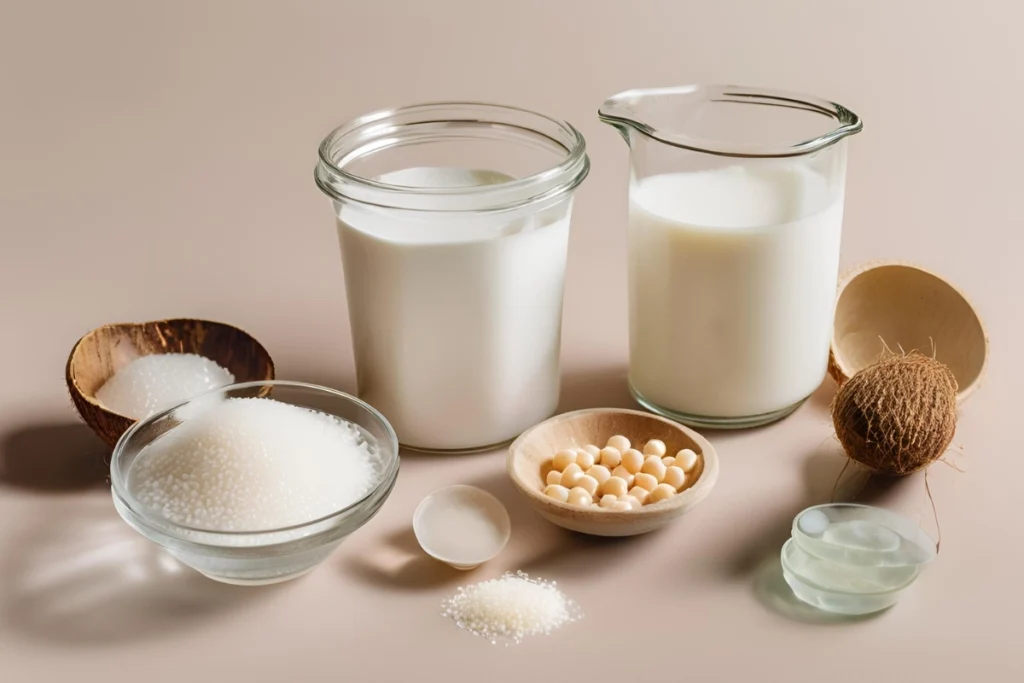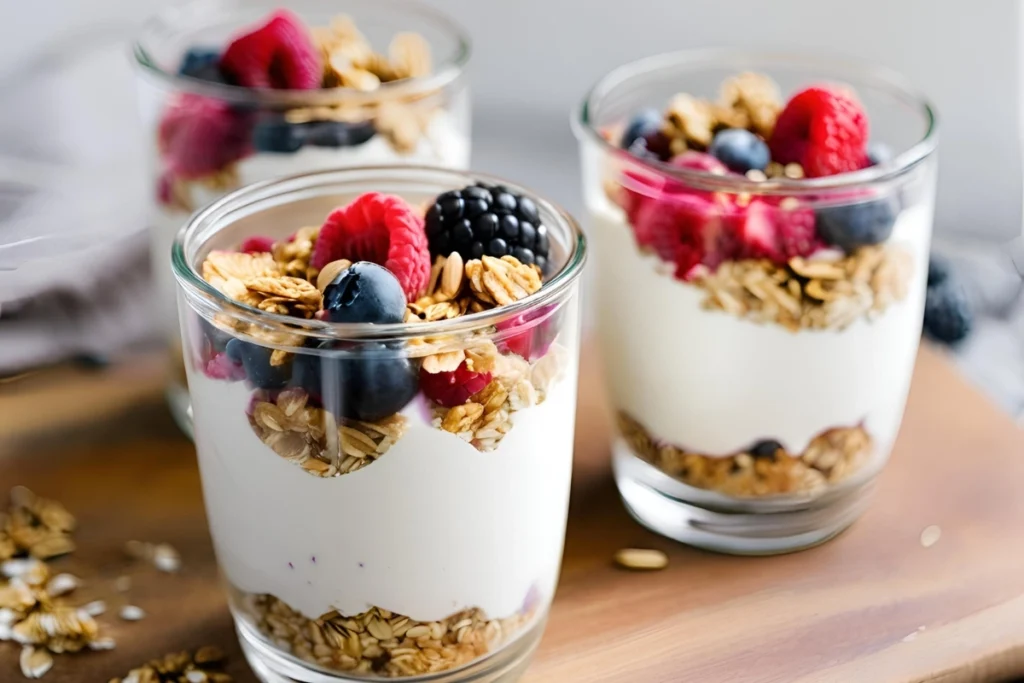Coconut yogurt health benefits have made it a star in the dairy-free aisle—but is it really as good for you as it looks on Instagram? With its creamy texture, tropical flavor, and plant-based appeal, it’s easy to see why so many are swapping their regular yogurt for this coconut-based alternative.
I still remember the first time I tried it—topped with fresh berries, a sprinkle of granola, and a drizzle of honey. It felt like dessert disguised as breakfast. But beyond taste, coconut yogurt comes with some impressive (and a few surprising) nutritional pros and cons. Let’s dive into what makes it healthy, when it might not be, and how to pick the one that truly lives up to the hype.
Is Coconut Yogurt Actually Healthy?
Coconut yogurt has become a popular choice among health-conscious consumers and those following specialized diets. Known for its creamy texture and tropical flavor, this dairy-free alternative offers many coconut yogurt health benefits, from being vegan-friendly to supporting gut health. But how does it compare to other yogurt options, and is it as healthy as it seems?
In this detailed guide, we’ll explore why coconut yogurt has gained traction, its nutritional composition, and who can benefit most from incorporating it into their diet.
Coconut Yogurt: Understanding the Popularity

Rising Interest in Plant-Based Yogurts
The shift toward plant-based diets has redefined the food industry, with an increasing number of people seeking alternatives to animal-derived products. This trend is driven by several factors, including environmental sustainability, ethical concerns, and health consciousness.
Coconut yogurt plays a significant role in this movement. Unlike traditional dairy yogurt, it is made from fermented coconut milk, offering a dairy-free option that fits seamlessly into vegan and plant-based lifestyles. Its tropical flavor and rich consistency make it a standout choice among other plant-based alternatives like almond or soy yogurt.
The demand for non-dairy yogurts has surged, with grocery stores now offering a variety of options. Coconut yogurt, in particular, is favored for its versatility and unique taste, making it suitable for everything from breakfast bowls to savory recipes.
Appeal of Dairy-Free and Vegan Alternatives
Dairy-free products are not just for vegans. Many individuals with lactose intolerance, dairy allergies, or digestive sensitivities are turning to coconut yogurt as a safe and delicious alternative. It mimics the texture of traditional yogurt while providing additional benefits, such as being cholesterol-free and rich in plant-based fats.
Moreover, this yogurt aligns with ethical and environmental goals. Coconut farming generally requires fewer resources compared to dairy farming, contributing to its appeal among eco-conscious consumers.
Who Should Consider Eating Coconut Yogurt?
Lactose-Intolerant Individuals
One of the primary audiences for coconut yogurt is people who cannot digest lactose, the sugar found in milk. For these individuals, traditional dairy products often lead to bloating, cramping, or discomfort. Coconut Yogurt Health Benefits provide a dairy-free alternative that allows them to enjoy the texture and tang of yogurt without the unpleasant side effects.
Additionally, it is free of casein and whey, the proteins in milk that can trigger allergic reactions in some people. This makes it a suitable option for those with milk allergies.
Vegans and Plant-Based Diet Followers
Vegans often struggle to find satisfying substitutes for dairy products. Coconut yogurt offers a versatile and nutrient-rich option that fits their dietary requirements. It can be used in a variety of recipes, from smoothie bowls to vegan desserts, allowing plant-based eaters to enjoy the same versatility as traditional yogurt.
With a growing number of brands offering plain and flavored options, vegans have access to a wide range of choices, catering to different tastes and preferences.
People with Dietary Restrictions
Coconut yogurt is not limited to vegans or the lactose-intolerant. It is also an excellent option for individuals following gluten-free, paleo, or low-FODMAP diets. Since it is naturally free of gluten and animal-derived ingredients, it caters to diverse dietary needs.
Those with nut allergies may also prefer coconut-based yogurt over almond or cashew varieties, as it is made from coconut milk and is generally nut-free.
Nutritional Overview of Coconut Yogurt

Key Ingredients Found in Coconut Yogurt
The primary ingredient in coconut yogurt is coconut milk, which is derived from the grated flesh of coconuts. This milk forms the creamy base of the yogurt and is responsible for its rich texture and tropical flavor.
Other essential components include:
- Probiotic Cultures: Live bacterial strains like Lactobacillus and Streptococcus ferment the coconut milk, creating yogurt’s tangy taste and offering gut-health benefits.
- Thickeners: Ingredients like tapioca starch, agar-agar, or pectin are often used to achieve a consistency similar to dairy yogurt.
- Sweeteners and Flavorings (Optional): Some brands add sugar, agave, or fruit purées to enhance flavor.
Comparison to Traditional Dairy Yogurts
While dairy yogurt is known for being high in protein and naturally rich in calcium, Coconut Milk Yogurt offers a different nutritional profile. It is:
- Lactose-Free: Making it ideal for those with lactose intolerance.
- Rich in Healthy Fats: Coconut yogurt contains medium-chain triglycerides (MCTs), which provide quick energy and support metabolism.
- Lower in Protein: Unlike dairy curd, which provides about 5–10 grams of protein per serving, coconut yogurt typically contains less unless fortified.
Common Additives and Sweeteners
Many commercial coconut yogurts include added sugars to enhance taste. While these can make the yogurt more appealing, they also increase its calorie content. Reading labels is crucial to avoid excessive sugar intake.
Natural varieties, which are free of added sugars and artificial flavors, are a healthier choice. These options allow consumers to enjoy the yogurt’s natural tangy flavor and tropical notes.
Coconut Yogurt Health Benefits: Understanding the Popularity
Coconut yogurt offers a variety of health benefits due to its nutrient composition and probiotic content. For many, it is more than just a dairy-free substitute—it’s a functional food that supports overall wellness.
Rich Source of Healthy Fats (MCTs)
Coconut yogurt is rich in medium-chain triglycerides (MCTs), a unique type of fat derived from coconut milk. Unlike long-chain fats, MCTs are metabolized quickly by the liver and converted into energy rather than being stored as fat.
Potential Benefits of MCTs:
- Energy Boost: MCTs provide a rapid energy source, making this yogurt a favorite among athletes and active individuals.
- Metabolic Support: Some research suggests that MCTs may help improve metabolism and assist with weight management.
- Brain Health: MCTs are believed to support cognitive function by providing an alternative energy source for brain cells.
However, it’s important to note that coconut yogurt is still high in saturated fats, so moderation is key, especially for individuals with heart health concerns.
Probiotics for Gut Health
Probiotics are one of the standout benefits of coconut yogurt. These live bacterial cultures are introduced during fermentation and help maintain a healthy balance of gut bacteria.
Key Gut-Health Benefits:
- Improved Digestion: Probiotics aid in breaking down food and enhancing nutrient absorption, as explained in this detailed guide by Harvard Health Publishing on the benefits of probiotics.
- Reduced Bloating: They can help alleviate digestive discomfort, especially for individuals sensitive to dairy products.
- Immune Support: A healthy gut microbiome plays a crucial role in overall immune function.
Not all coconut yogurts are equal in probiotic content, so look for labels indicating “live and active cultures.” These ensure that the yogurt contains beneficial bacteria that have survived the production process.
Vitamins and Minerals in
While coconut yogurt is not naturally rich in certain nutrients found in dairy curd, many brands fortify their products with vitamins and minerals to enhance their nutritional profile.
Commonly Added Nutrients:
- Calcium: Essential for bone health, calcium is often added to mimic the levels found in dairy yogurt.
- Vitamin D: Supports calcium absorption and immune health, making it a valuable addition for plant-based eaters.
- Vitamin B12: Important for energy production and red blood cell formation, B12 is particularly beneficial for vegans who might lack this nutrient in their diet.
When choosing a coconut yogurt, check the nutrition label to ensure it meets your dietary needs, especially if you rely on it as a source of these nutrients.
Is Coconut Yogurt Better Than Regular Yogurt?
The debate over whether coconut yogurt is better than dairy yogurt depends on individual dietary needs, preferences, and health goals.
Comparing Nutritional Profiles
Coconut yogurt offers a different nutritional profile compared to regular yogurt:
- Protein: Dairy yogurt is higher in protein, with 5–10 grams per serving, while coconut yogurt generally contains less unless fortified.
- Fats: is higher in saturated fats due to its base ingredient, coconut milk.
- Lactose-Free: Unlike dairy yogurt, it is naturally free of lactose, making it gentler on digestion for those with sensitivities.
While coconut yogurt shines in providing healthy fats and probiotics, it may not be as protein-rich as traditional yogurt, making it less suitable as a primary protein source.
Digestibility and Tolerance in Sensitive Individuals
For individuals with lactose intolerance, Coconut Yogurt Health Benefits are a game-changer. Dairy-based products can cause bloating, cramping, or other digestive issues due to their lactose content. It offers the same creamy consistency and tangy flavor without the digestive discomfort.
Additionally, it is free of casein, a milk protein that can trigger inflammation or allergies in some people. This makes it a suitable choice for those with dairy allergies or sensitivities.
Environmental and Ethical Considerations
Coconut yogurt aligns with the values of eco-conscious consumers. Coconuts require significantly less water and land to produce compared to dairy farming, which is resource-intensive and associated with higher greenhouse gas emissions.
For those concerned about animal welfare, coconut yogurt also provides an ethical alternative to dairy-based products, as it involves no animal exploitation. These factors make it a popular choice among environmentally minded and ethical consumers.
Common Misconceptions
Despite its growing popularity, there are misconceptions about coconut yogurt that need clarification.
“Low-Calorie” Assumption
Many people assume that plant-based yogurts are inherently low in calories. However, it can be calorie-dense due to its fat content. While MCTs are considered healthy fats, they still contribute to the overall caloric value.
For those watching their calorie intake, unsweetened varieties are the best choice. They avoid the added sugars found in many flavored options, which can significantly increase the calorie count.
Misunderstanding the Role of Probiotics
Not all coconut yogurts contain the same level of probiotics. Some brands may not include live cultures, reducing the potential gut-health benefits.
Consumers should look for labels with terms like “live and active cultures” to ensure they are getting a product with meaningful probiotic content. Additionally, the strains of probiotics and their concentration can vary, so reading labels carefully is crucial.
Concerns Over Artificial Additives
Some coconut yogurts include artificial thickeners, flavors, or preservatives to improve taste and texture. These additives can detract from the overall health value of the yogurt.
To avoid these, opt for products with minimal ingredients, focusing on natural thickeners like agar-agar or pectin and simple flavorings like vanilla or fruit purées.
Scientific and Historical Context
The Evolution of Yogurt Alternatives
The popularity of plant-based yogurts has grown significantly over the past decade. Coconut Yogurt Health Benefits, in particular, reflect the broader trend of accommodating dietary restrictions and plant-based preferences.
Research on Coconut-Based Products
Studies on coconut products highlight their potential health benefits, including the positive effects of MCTs and probiotics. While these findings are promising, moderation is recommended due to the high saturated fat content in coconut-based foods.
Consumer Trends in Plant-Based Nutrition
As plant-based diets become mainstream, coconut yogurt is expected to maintain its place as a popular alternative. The demand for sustainable, allergen-friendly, and versatile products continues to drive innovation in the industry.
Practical Guide to Including Coconut Yogurt in Your Diet

Coconut yogurt is not only a delicious dairy-free alternative but also a versatile ingredient that can be easily incorporated into various meals. Whether you prefer sweet or savory dishes, this yogurt adds texture, flavor, and nutritional value to your diet.
Best Ways to Eat Coconut Yogurt

As a Breakfast Staple
One of the most popular uses for coconut yogurt is as a base for a nourishing breakfast. Its creamy consistency pairs beautifully with fruits, nuts, and grains, creating a balanced and flavorful meal.
Ideas for Breakfast:
- Parfaits: Layer coconut yogurt with granola, fresh berries, and a drizzle of honey or maple syrup for a simple yet satisfying morning treat.
- Smoothie Bowls: Use it as the base of a smoothie bowl, topped with sliced bananas, chia seeds, and shredded coconut for extra texture.
- Overnight Oats: Mix it with oats, almond milk, and a touch of vanilla for a creamy, make-ahead breakfast.
Incorporating into Smoothies and Desserts
Coconut yogurt enhances the creaminess of smoothies and can serve as a key ingredient in many desserts.
Smoothie Ideas:
- Blend it with frozen mango, spinach, and coconut water for a tropical, nutrient-packed drink.
- Pair it with peanut butter, cacao powder, and a frozen banana for a dessert-like smoothie.
Dessert Applications:
- Cheesecake Substitute: Use it in place of cream cheese in vegan cheesecakes for a light, tangy flavor.
- Fruity Toppings: Dollop it on fruit salads or grilled peaches for a refreshing dessert.
Using as a Dairy Replacement in Recipes
It works wonderfully as a substitute for dairy in many savory dishes. Its tangy flavor and creamy texture mimic sour cream or traditional yogurt in recipes.
Savory Applications:
- Marinades: Combine it with spices, lemon juice, and garlic to create a flavorful marinade for tofu, chicken, or vegetables.
- Dressings: Whisk it into a creamy salad dressing with herbs and olive oil.
- Curries: Stir it into soups and curries for a rich, smooth consistency.
Choosing the Right Coconut Yogurt
Understanding Food Labels and Ingredients
Reading labels is crucial when selecting coconut yogurt to ensure it aligns with your dietary goals. Look for options with:
- Simple Ingredients: Coconut milk, live cultures, and natural thickeners should form the base.
- No Added Sugars: Unsweetened varieties are healthier and allow you to control sweetness.
- Fortification: Choose brands fortified with calcium, vitamin D, or B12 to boost nutritional value.
Organic vs. Conventional Options
Organic coconut yogurt often comes from coconuts grown without synthetic pesticides or fertilizers. If sustainability and clean eating are priorities, opting for organic is a worthwhile choice.
Avoiding Added Sugars and Preservatives
Flavored coconut yogurts can contain significant amounts of added sugars and artificial preservatives. For a healthier option, select plain yogurt and sweeten it naturally at home with fresh fruit or honey.
Potential Challenges and Solutions
Cost of Coconut Yogurt Compared to Dairy
Coconut yogurt is often more expensive than traditional dairy yogurt due to the cost of production and ingredients.
Solution:
- Make It at Home: With just coconut milk, probiotic capsules, and a thickener, you can easily prepare your own yogurt at a fraction of the cost.
Adjusting to the Taste and Texture
For some, the tropical flavor and slightly thicker consistency of coconut yogurt may take time to appreciate.
Solution:
Experiment with recipes that balance its taste, such as blending it into smoothies or incorporating it into flavorful dishes like curries or dressings.
Availability in Different Markets
In smaller towns or areas with limited grocery options, coconut yogurt may be harder to find.
Solution:
- Online Shopping: Many brands are available for purchase online.
- Homemade Alternatives: Making your own allows you to customize the yogurt to your preferences while ensuring availability.
The Future of Coconut Yogurt
Innovations in Plant-Based Yogurt Products
The plant-based food industry continues to innovate, and coconut yogurt is no exception. Manufacturers are working on improving its nutritional profile by adding protein, reducing fat content, and incorporating more sustainable packaging.
Predictions for Market Growth and Trends
With the global shift toward plant-based diets, the demand for coconut yogurt is expected to grow significantly. Analysts predict the introduction of more exotic flavors, fortified options, and even hybrid products combining coconut with other plant bases like almond or oat.
Expanding Health and Sustainability Benefits
Future developments may focus on enhancing the environmental benefits of Coconut Yogurt Health Benefits, such as sourcing coconuts more sustainably or reducing waste in production. Healthwise, we may see fortified options with additional nutrients like omega-3s or plant-based protein.

Homemade Coconut Yogurt
Ingredients
Method
- Shake or whisk the coconut milk to ensure it is smooth and well-blended. If using starch, whisk it into the milk until no lumps remain.
- Pour the coconut milk into a sterilized glass jar or bowl.
- Open the probiotic capsules and sprinkle the powder into the coconut milk. Whisk gently to combine.
- Cover the jar loosely with a clean cloth or paper towel secured with a rubber band. Let it sit at room temperature (75–80°F) for 24–48 hours to ferment. The longer it sits, the tangier it will become.
- Once fermentation is complete, taste and add sweetener if desired. Stir well.
- Refrigerate for at least 4 hours to thicken further before serving. Store covered in the fridge for up to 7 days.
Nutrition
Notes
Tried this recipe?
Let us know how it was!Summary and Final Thoughts
Key Takeaways on Coconut Yogurt’s Health Benefits
Coconut yogurt offers several advantages:
- It’s dairy-free, vegan-friendly, and suitable for those with dietary restrictions.
- Probiotics and MCTs provide gut health and energy benefits.
- It is a versatile ingredient for both sweet and savory dishes.
Final Word on Its Role in a Balanced Diet
While not a complete replacement for dairy yogurt in terms of protein, coconut yogurt is an excellent addition to a balanced diet. It works well for individuals seeking a plant-based alternative or those avoiding lactose. Moderation is key, especially for those mindful of saturated fat intake.
Recommended Resources for Further Reading
- “Probiotics and Gut Health Explained”: A comprehensive guide to understanding how probiotics support digestion.
- “DIY Coconut Yogurt Recipe”: A step-by-step tutorial on making your own yogurt at home.
- “Plant-Based Dairy Alternatives”: A comparison of non-dairy milk and yogurt options.
Coconut yogurt is more than just a trend—it’s a nutritious, sustainable, and delicious alternative that’s here to stay.
Stay Connected with Feel the Recipes
Love cooking and sharing good food? Let’s stay connected! Clara posts new recipes, helpful tips, and little moments from her kitchen every day to keep you inspired.
Join our growing community of home cooks who believe food is meant to be simple, joyful, and shared around the table.
👉 Facebook: Follow us on Facebook
📌 Pinterest: Explore our boards for endless recipe inspiration
🐦 X (Twitter): @feeltherecipes for quick tips and updates
📸 Instagram: @feeltherecipes for fresh photos and behind-the-scenes peeks
Let’s keep cooking, creating, and sharing. Whether you’re here for classic comfort food or something new to try, we’re just a click away.
